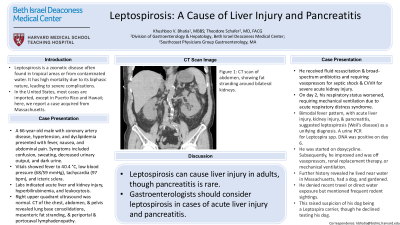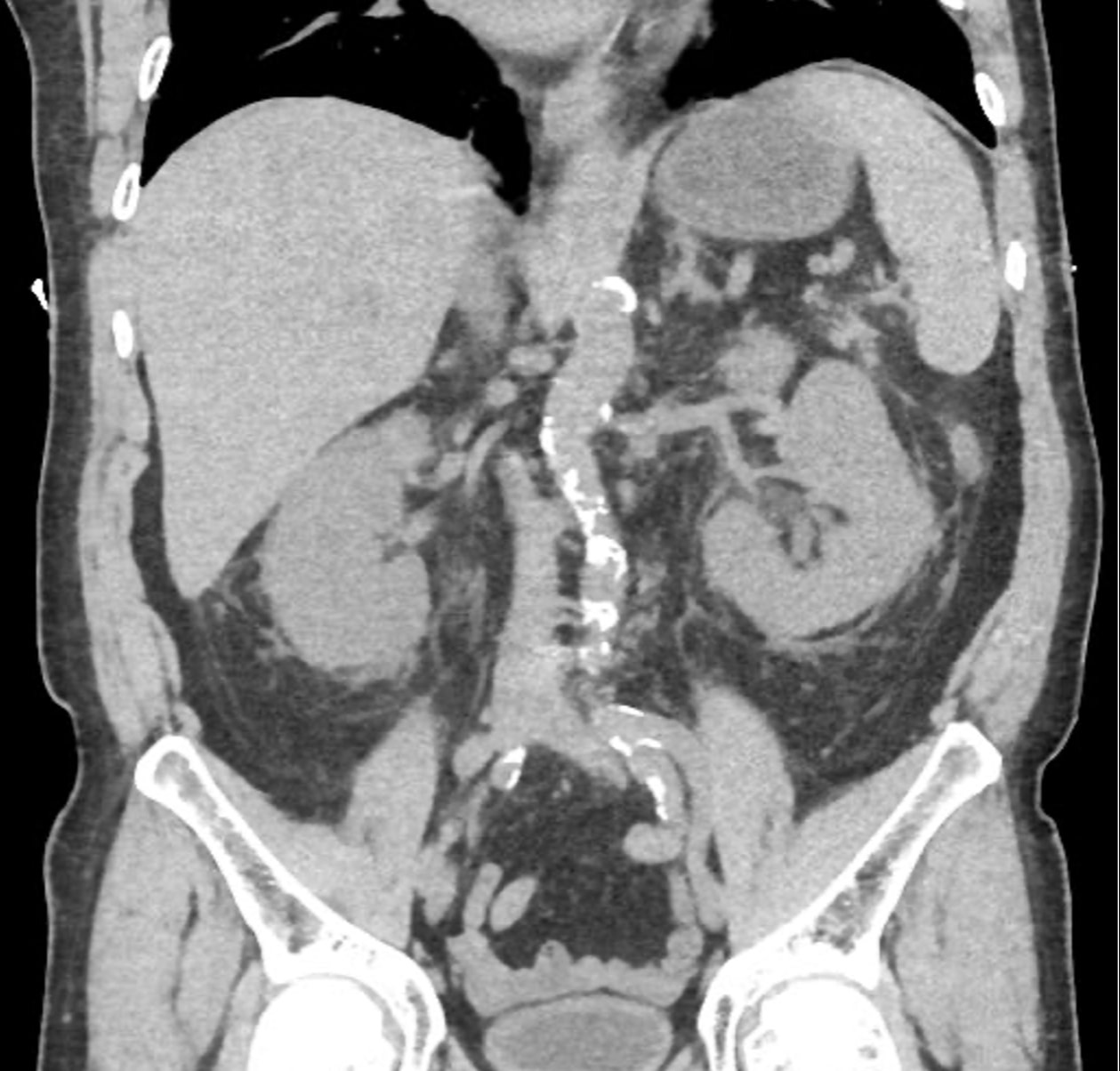Monday Poster Session
Category: Liver
P2993 - Unveiling a Tropical Disease as a Cause of Liver Injury and Pancreatitis: Icterohemorrhagic Leptospirosis
Monday, October 28, 2024
10:30 AM - 4:00 PM ET
Location: Exhibit Hall E


Khushboo V. Bhatia, MBBS
Beth Israel Deaconess Medical Center, Harvard Medical School
Boston, MA
Presenting Author(s)
Award: Presidential Poster Award
Khushboo V. Bhatia, MBBS
Beth Israel Deaconess Medical Center, Harvard Medical School, Boston, MA
Introduction: Leptospirosis is a zoonotic disease contracted from animal urine, often in tropical climates or through contact with contaminated water. It has a high mortality rate due to its bi-phasic nature and can cause severe complications in the latter stages. In the United States, most cases are imported, except in Puerto Rico and Hawaii; here, we report a case acquired from Massachusetts.
Case Description/Methods: A 66-year-old male presented with fever, nausea, & abdominal pain. His symptoms began 5 days earlier with a fever of 40.4 °C, confusion, and sweating. He then developed abdominal pain, nausea, vomiting, poor oral intake, decreased urinary output, and dark urine. Past medical history included coronary artery disease, hypertension, dyslipidemia.
He appeared ill & jaundiced. His blood pressure was 68/59 Hg, pulse 97, temperature 37.1 °C, & respirations 27 per minute. He had icteric sclera, conjunctival suffusion, an irregular heart rhythm, & rales at the lung bases. Abdominal tenderness was noted in the upper quadrants.
Lab results showed elevated white blood cells, acute liver and kidney injury, & direct hyperbilirubinemia. Right upper quadrant ultrasound was normal. CT of the chest, abdomen, & pelvis revealed lung base consolidations, mesenteric fat stranding, & periportal & portocaval lymphadenopathy.
He received fluid resuscitation & broad-spectrum antibiotics. He was started on vasopressors for septic shock & CVVH for severe acute kidney injury. On day 2, his respiratory status worsened, requiring mechanical ventilation due to acute respiratory distress syndrome. Bimodal fever pattern, with acute liver injury, kidney injury, & pancreatitis, icterohemorrhagic leptospirosis (Weil’s disease) was considered as a unifying diagnosis. A urine PCR for Leptospira spp. DNA was positive on day 6. He was started on doxycycline. Subsequently, he no longer required vasopressors, renal replacement therapy, or mechanical ventilation.
Further history revealed he lived near water in Massachusetts, had a dog, and gardened. He denied recent travel or direct water exposure but mentioned frequent rodent sightings. This raised suspicion of his dog being a Leptospira carrier, though he declined testing his dog.
Discussion: Leptospirosis is a well-known cause of liver injury, though pancreatitis has been reported in children with leptospirosis but not in adults. Gastroenterologists should maintain a broad differential for acute liver injury & pancreatitis and leptospirosis should be considered a potential etiology.

Disclosures:
Khushboo V. Bhatia, MBBS. P2993 - Unveiling a Tropical Disease as a Cause of Liver Injury and Pancreatitis: Icterohemorrhagic Leptospirosis, ACG 2024 Annual Scientific Meeting Abstracts. Philadelphia, PA: American College of Gastroenterology.
Khushboo V. Bhatia, MBBS
Beth Israel Deaconess Medical Center, Harvard Medical School, Boston, MA
Introduction: Leptospirosis is a zoonotic disease contracted from animal urine, often in tropical climates or through contact with contaminated water. It has a high mortality rate due to its bi-phasic nature and can cause severe complications in the latter stages. In the United States, most cases are imported, except in Puerto Rico and Hawaii; here, we report a case acquired from Massachusetts.
Case Description/Methods: A 66-year-old male presented with fever, nausea, & abdominal pain. His symptoms began 5 days earlier with a fever of 40.4 °C, confusion, and sweating. He then developed abdominal pain, nausea, vomiting, poor oral intake, decreased urinary output, and dark urine. Past medical history included coronary artery disease, hypertension, dyslipidemia.
He appeared ill & jaundiced. His blood pressure was 68/59 Hg, pulse 97, temperature 37.1 °C, & respirations 27 per minute. He had icteric sclera, conjunctival suffusion, an irregular heart rhythm, & rales at the lung bases. Abdominal tenderness was noted in the upper quadrants.
Lab results showed elevated white blood cells, acute liver and kidney injury, & direct hyperbilirubinemia. Right upper quadrant ultrasound was normal. CT of the chest, abdomen, & pelvis revealed lung base consolidations, mesenteric fat stranding, & periportal & portocaval lymphadenopathy.
He received fluid resuscitation & broad-spectrum antibiotics. He was started on vasopressors for septic shock & CVVH for severe acute kidney injury. On day 2, his respiratory status worsened, requiring mechanical ventilation due to acute respiratory distress syndrome. Bimodal fever pattern, with acute liver injury, kidney injury, & pancreatitis, icterohemorrhagic leptospirosis (Weil’s disease) was considered as a unifying diagnosis. A urine PCR for Leptospira spp. DNA was positive on day 6. He was started on doxycycline. Subsequently, he no longer required vasopressors, renal replacement therapy, or mechanical ventilation.
Further history revealed he lived near water in Massachusetts, had a dog, and gardened. He denied recent travel or direct water exposure but mentioned frequent rodent sightings. This raised suspicion of his dog being a Leptospira carrier, though he declined testing his dog.
Discussion: Leptospirosis is a well-known cause of liver injury, though pancreatitis has been reported in children with leptospirosis but not in adults. Gastroenterologists should maintain a broad differential for acute liver injury & pancreatitis and leptospirosis should be considered a potential etiology.

Figure: Figure 1: CT scan of abdomen, showing fat stranding around bilateral kidneys.
Disclosures:
Khushboo Bhatia indicated no relevant financial relationships.
Khushboo V. Bhatia, MBBS. P2993 - Unveiling a Tropical Disease as a Cause of Liver Injury and Pancreatitis: Icterohemorrhagic Leptospirosis, ACG 2024 Annual Scientific Meeting Abstracts. Philadelphia, PA: American College of Gastroenterology.

